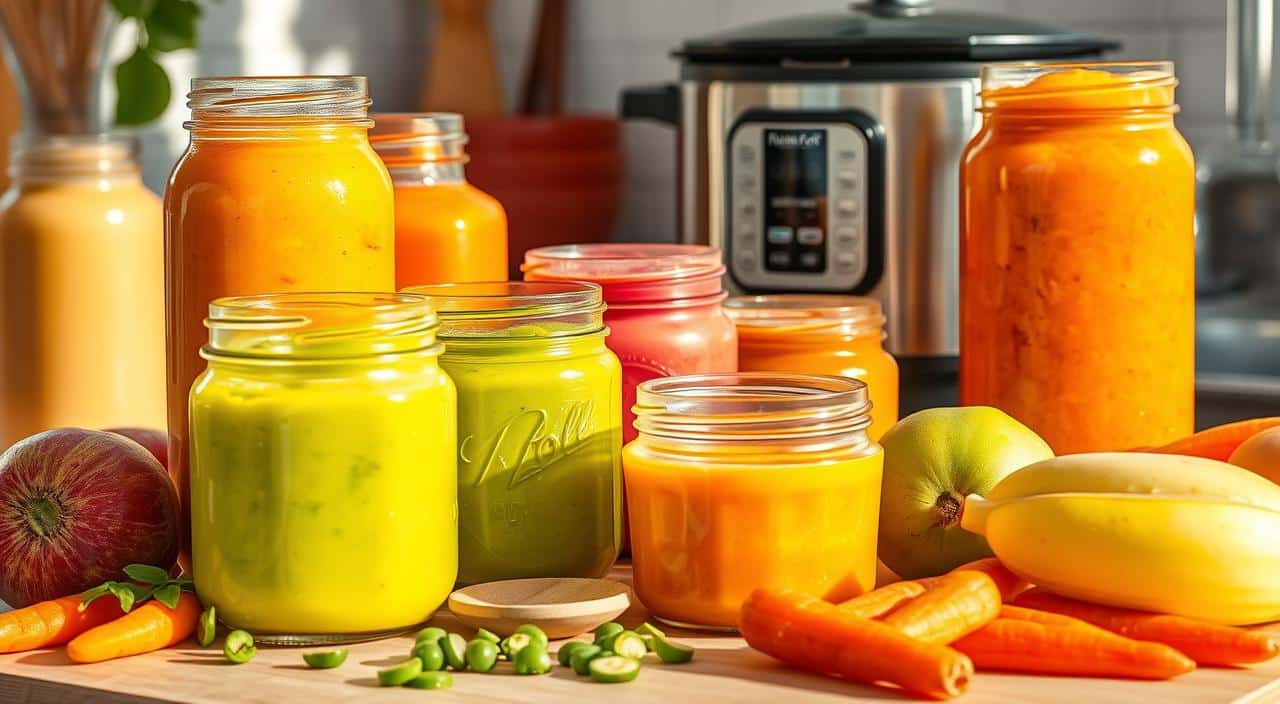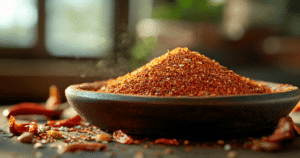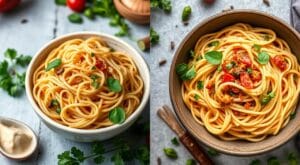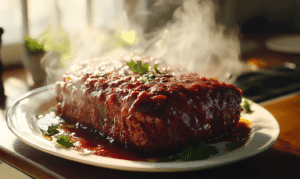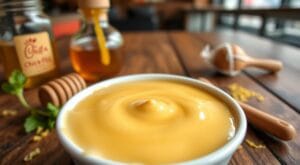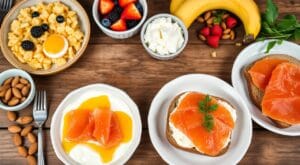Jump to:
Estimated reading time: 13 minutes
Table of contents
Homemade food for babies is one of the essentials for babies growth and development, choosing what to feed our babies is a big decision. Homemade baby food is better than store-bought for many reasons. It’s healthier, you can make it your way, and it saves money. Let’s dive into why making your baby’s food is a great choice.
Key Takeaways
- Homemade baby food lets you pick the ingredients, giving your baby a healthy diet.
- It’s cheaper and can be made to fit your baby’s taste and needs.
- Recipes can grow with your baby, from simple purees to finger foods.
- Offering a mix of fruits, veggies, grains, and proteins helps your baby grow strong.
- It’s also good for the planet, cutting down on waste and using containers again.
Introduction
Feeding our babies healthy foods is key for their growth. This article will help parents make homemade baby food. Making meals at home lets you choose ingredients, save money, and match flavors to your baby’s taste.
As babies start eating solids, it’s important to offer a variety of healthy foods. Homemade baby food gives your baby the best nutrition and lets you adjust textures and tastes. Learning to make homemade baby food is a rewarding way to meet your child’s nutritional needs.
We’ll cover the benefits of homemade meals, suitable foods for babies, tasty recipes, and tips on storage and customization. This guide is for all parents, whether you’re new or experienced. It will help you make smart choices and lay a strong foundation for your baby’s eating habits.
Homemade stage 1 baby food pureesare a great way to introduce solid foods. Andmicrowaved flour for cookiesis a safe and easy way to make edible cookie dough.
| Key Insights on Introducing Solid Foods to Babies |
|---|
| – Not all babies start solid foods at the recommended age of 6 months; some can begin as early as 4 months. |
| – A 2013 study suggests that babies starting solid foods by 6 months have a reduced risk of allergies and asthma. |
| – Common allergens for babies include eggs, peanut, wheat, soy, fish, and shellfish. |
| – New eaters typically require 1 to 2 tablespoons of food per meal. |
Understanding these insights helps parents make informed choices. It sets a strong foundation for their baby’s healthy eating habits.
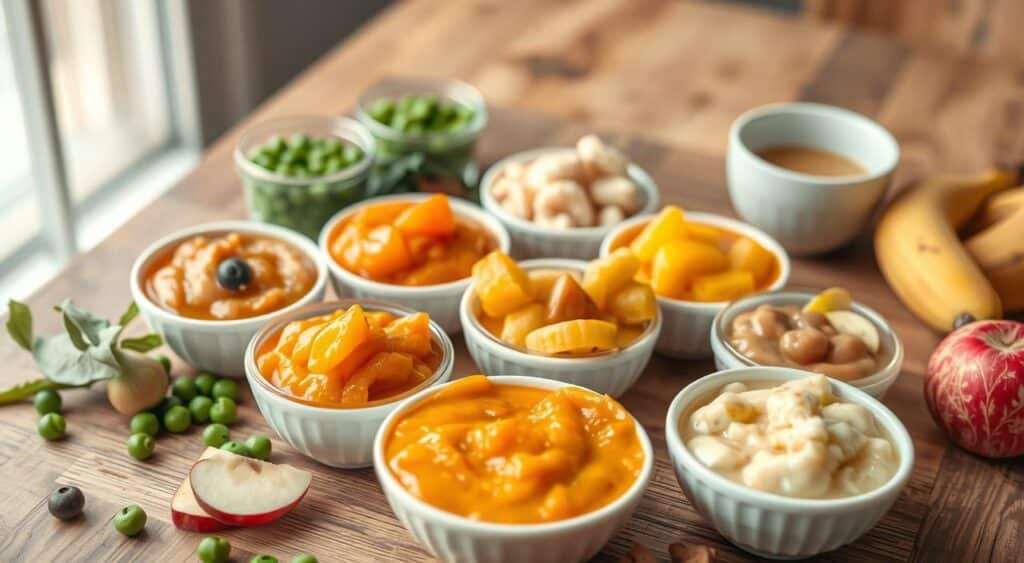
Why Homemade Food for Babies is a Great Choice
Homemade baby food has many advantages over store-bought options. By preparing food at home, you control the ingredients. This means your baby gets the best and healthiest meals. You can also adjust flavors and textures to match your baby’s taste preferences.
Benefits of Homemade Baby Food Over Store-Bought
Making your own baby food lets you tailor it to your child’s needs. You can change the consistency, flavors, and nutrients to support their growth. Plus, it’s often cheaper than buying pre-made jars or pouches.
Control Over Ingredients and Nutrition
When you make food at home, you know exactly what’s in it. You can avoid harmful additives and preservatives found in commercial foods. Homemade meals also keep more of the natural nutrients your baby needs for health and growth.
Cost-Effective and Customizable Meals
Homemade baby food is a budget-friendly choice. You can use fresh, local ingredients and adjust flavors and textures as you like. This saves money and introduces your baby to a variety of tastes and nutrients.
| Homemade Baby Food | Store-Bought Baby Food |
|---|---|
| Customizable ingredients and flavors | Limited flavor and texture options |
| Retains more natural nutrients | Potential loss of nutrients during processing |
| Cost-effective and budget-friendly | Can be more expensive in the long run |
| Allows exposure to a wider variety of foods | Offers pre-packaged, staged options |
In summary, homemade baby food offers many benefits. It gives you control over ingredients, allows for customization, and is cost-effective. By making meals at home, you ensure your baby gets the best and most flavorful foods for their development.
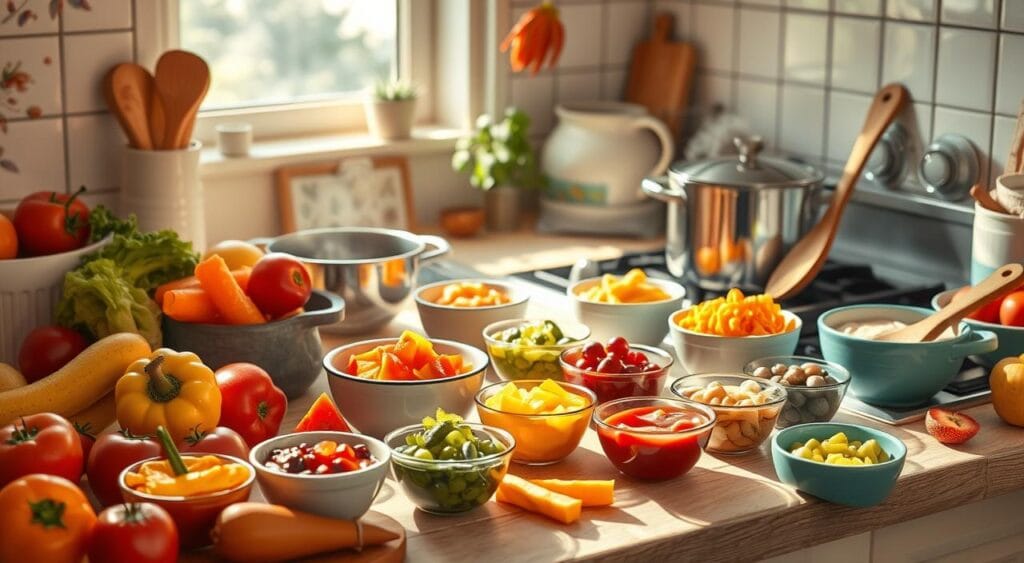
What Homemade Food Can Babies Eat?
Homemade baby food offers a wide range of choices. You can make everything from fruit purees to vegetable dishes. These options are both nutritious and tasty for your little one.
Fruit Purees: Simple and Nutritious Options
Fruit purees, like bananas, pears, and apples, are full of vitamins and sweetness. They are simple and perfect for introducing solid foods to your baby.
Vegetable-Based Dishes for Essential Nutrients
Vegetable dishes, such as sweet potatoes, carrots, and green beans, are packed with fiber, vitamins, and minerals. They are great for starting your child’s health journey.
Grains and Proteins Suitable for Babies
Grains like brown rice, quinoa, and oats, and proteins like chicken, fish, and eggs, are also good for baby food. They add essential nutrients for growth and development.
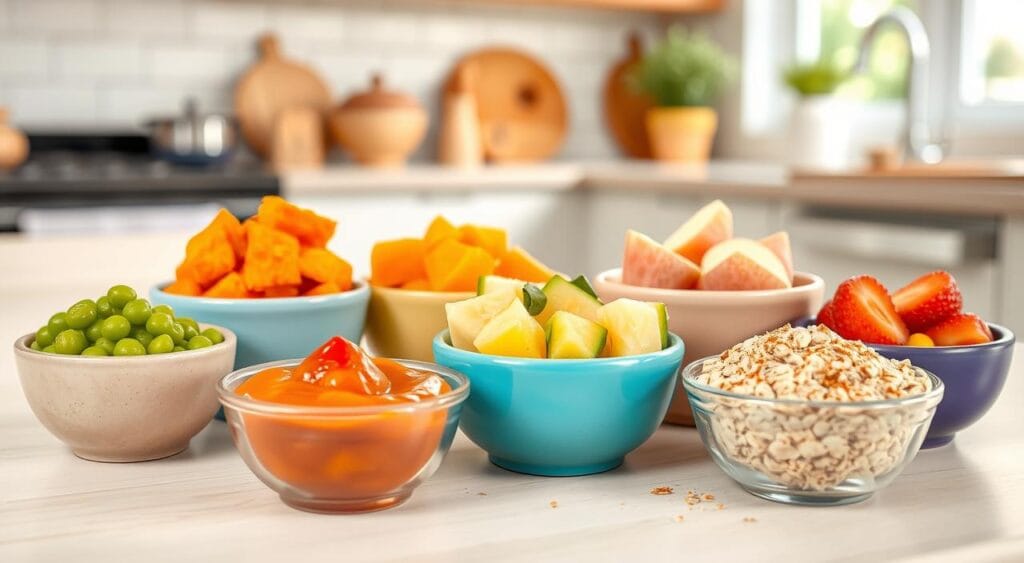
Trying different homemade foods ensures your baby gets a balanced diet. This is key during their early years.
Best Homemade Food Recipes for Babies
Homemade baby food recipes are a tasty and healthy choice for your baby. This section shares three simple, nutritious recipes you can make at home. From the creamy Mashed Sweet Potato and Carrot to the creamy Banana and Avocado Puree, these recipes will make your baby happy and healthy.
Mashed Sweet Potato and Carrot
This vibrant puree mixes sweet potatoes’ natural sweetness with carrots’ nutrients. Roast 2 to 3 sweet potatoes, then blend them with 1 to 2 cooked and peeled carrots until smooth. Add water, breast milk, or formula to get the right texture for your baby.
Creamy Banana and Avocado Puree
Try this creamy mix of ripe banana and avocado for a satisfying option. Mash 1 ripe banana and 1/2 an avocado until smooth. Add water, breast milk, or formula to get the perfect texture for your baby.
Quinoa and Pea Mash
This recipe combines protein-rich quinoa with green peas. Cook 1 cup of brown quinoa as directed, then blend it with 1/2 cup of cooked peas until smooth. Adjust the consistency as needed for a nourishing meal.
These homemade baby food recipes are not only delicious but also full of essential nutrients. By making these meals at home, you control the ingredients and ensure your baby gets the best nutrition.
How to Customize Homemade Food for Babies
As babies grow, they need different textures in their food. This helps them move from smooth purees to chunkier meals. We’ll talk about adding herbs and spices safely and how to adjust food amounts as they grow.
Introducing Different Textures as Baby Grows
Babies start with smooth, thin purees when they begin solids. As they get better at eating, introduce thicker textures. This includes small soft lumps or pieces. It helps them learn to chew and swallow.
Here’s a guide on texture progression:
- Stage 1 (6-8 months): Thin, smooth purees
- Stage 2 (8-10 months): Thicker purees with small soft lumps
- Stage 3 (10-12 months): Mashed or finely chopped table foods
How to Add Herbs and Spices Safely
Herbs and spices can add flavor to baby food, but use them carefully. Start with a small amount, about 1/4 teaspoon per serving. Watch how your baby reacts. Avoid spicy or acidic seasonings that might upset their stomach.
Here are some safe options:
- Cinnamon
- Nutmeg
- Oregano
- Basil
- Dill
Adjusting Portion Sizes for Age and Stage
Babies need more food as they grow. Increase portion sizes to meet their growing needs. A good rule of thumb is:
| Age | Portion Size |
|---|---|
| 6-8 months | 2-4 tablespoons per meal |
| 8-10 months | 4-6 tablespoons per meal |
| 10-12 months | 6-8 tablespoons per meal |
Every baby is different. Adjust portions based on their appetite and cues.
Common Mistakes to Avoid When Preparing Homemade Baby Food
Making homemade baby food is healthier and cheaper. But, there are mistakes to avoid. It’s key to balance meals, introduce new foods carefully, and avoid overcooking to keep nutrients.
Not Balancing Nutrition Properly
One mistake is not balancing baby food nutrition. Some parents make too much, wasting food. It’s better to make less and cook more often to avoid spoilage.
Also, too much liquid can make food too runny. This might make your baby not want to eat. So, it’s important to measure liquids right for the right texture.
Using Ingredients Too Early (Allergies and Sensitivities)
Introducing new foods too soon can cause allergies. Babies usually start solids at 6 months. Wait 3 to 5 days between new foods to check for reactions.
For babies at low risk, early exposure to common allergens is okay. This includes eggs, dairy, soy, peanuts, or fish.
Overcooking Food and Losing Nutrients
Overcooking baby food can lose nutrients. Store-bought food might be cooked too much, losing vitamins and minerals. Homemade food should be lightly cooked to keep nutrients.
It’s also important to clean and store homemade food well. This ensures your baby gets the freshest and safest food.
| Common Mistake | Impact | Recommendation |
|---|---|---|
| Preparing excessive baby food | Leads to wastage | Reduce amount and cook more frequently |
| Using excessive liquid in baby food | Results in runny consistency | Properly measure liquids to maintain right texture |
| Introducing new ingredients too early | Can lead to allergies or sensitivities | Wait 3-5 days between new single-ingredient foods |
| Overcooking homemade baby food | Loss of valuable nutrients | Lightly cook through steaming or microwaving |
“It’s important to wait three to five days between introducing new single-ingredient foods to pinpoint any reactions or allergies.”
How to Store Homemade Food for Babies
Homemade baby food can save time and money. But, it’s important to store it right to keep it fresh and healthy. This guide will help you find the best containers, know how long to store it, and how to reheat it safely.
Best Containers for Freezing and Storing Baby Food
Ice cube trays are great for freezing baby food because they make portioning easy. Each cube is about one ounce. But, avoid using glass baby food jars or other glass containers for freezing because they can break and be harmful.
Instead, use “ok to freeze” plastic containers. They are safer for storing your baby’s meals.
How Long You Can Store Homemade Baby Meals
- Fruits and veggie purees can be stored in the fridge for 2 to 3 days and in the freezer for 6 to 8 months.
- Meat purees should be consumed within 1 day if stored in the fridge and used within 1 to 2 months if stored in the freezer.
- Meat and veggie mixed purees can be kept in the fridge for 1 to 2 days and in the freezer for 1 to 2 months.
Reheating and Thawing Tips for Busy Parents
To thaw frozen baby food, put it in the fridge. It takes 4-12 hours to thaw completely. Once thawed, it can be stored in the fridge for up to 48 hours.
When reheating, always check the food’s temperature before serving. Reheated baby food should not be refrozen or reheated again to avoid health risks.
By following these tips, you can keep your homemade baby food fresh, healthy, and safe for your baby to eat.
Nutritional Impact of Homemade Food for Babies
Choosing between homemade and store-bought baby food is crucial for your baby’s health. Homemade baby food has big nutritional benefits. It lets parents make sure their baby gets all the nutrients they need to grow strong.
Ensuring a Balanced Diet with Homemade Recipes
Homemade food lets parents pick what goes into their baby’s meals. A study by Hirbig et al. (2015) showed homemade meals can be much better than store-bought ones. This is because homemade food can offer a wide range of important nutrients.
Key Nutrients Babies Need for Healthy Growth
Babies need lots of nutrients to grow well. These include protein, iron, zinc, vitamin A, vitamin C, and calcium. Homemade food can give babies these nutrients by using foods like fruits, veggies, grains, and proteins. A varied diet, as Krebs-Smith et al. (1987) found, makes a baby’s nutrition better.
Low-Sodium and Sugar-Free Homemade Recipes
Homemade food also lets parents control sodium and sugar levels. Many baby foods from stores have too much of these. But, homemade recipes can be made without sodium and sugar. This helps babies develop healthy eating habits early on.
In summary, homemade baby food is very good for their health. It ensures babies get all the nutrients they need and avoids the bad stuff in store-bought foods.
FAQ: Homemade Food for Babies
When Should I Introduce Solid Foods?
Experts say to start solids between 4 and 6 months. Look for signs like sitting up, head control, and swallowing food. Also, watch for curiosity about food.
How Long Can I Store Homemade Baby Food?
Refrigerate homemade baby food for 3-5 days. Freeze it for 4-6 months. Always follow food safety tips to keep meals safe and fresh.
How Should I Introduce Textures?
Start with very thin, pureed food. Gradually add texture as your baby gets older. This makes it easier for them to explore new tastes and textures.
How Can I Repurpose Leftovers?
Use leftovers in creative ways. Mix fruit purees into oatmeal or yogurt. Add vegetable purees to pasta sauces. Use bean or meat purees as spreads in dishes like quesadillas.
What Types of Baby Food Can I Freeze?
You can freeze all baby food types. This includes fruit, vegetable, grain, bean, and meat purees. Store them for up to 4-6 months.
Is Homemade Baby Food More Affordable?
Yes, making your own baby food can save money. For example, a 4-ounce banana puree jar costs about $1.00. But a fresh banana costs only $0.19.
Is Homemade Baby Food Healthier?
Yes, homemade baby food is often healthier. It has less sodium and sugar than store-bought options. Plus, you control the ingredients and flavors.
What About Food Allergies?
Watch for signs of food allergies like rashes, vomiting, or breathing trouble. If you see these signs, stop the food and talk to your pediatrician.
Conclusion: Nurturing Your Baby with Healthy, Homemade Meals
Preparing homemade food for your baby has many benefits. You can control what they eat and save money. Plus, you can make meals just right for your baby’s taste.
Making baby food at home is a great way to start your child off right. It lets you introduce solid foods and adjust to their growing needs. Homemade meals offer a special touch that store-bought can’t match.
Choosing to make your baby’s food is a smart choice for their health. It helps them develop good eating habits and supports their growth. Let’s celebrate the joy of making homemade baby food and the bright future it promises for your child.
